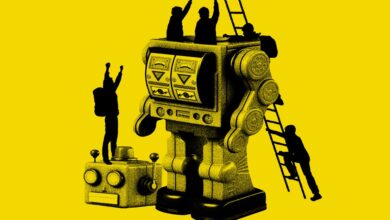Will AI tools lead to fewer software developer jobs?

Tariq Hook has been writing software code since the 1990s.
“Nobody can say it hasn’t changed,” he told me.
Currently both a staff software engineer and cofounder of an AI-forward custom software shop, Hook may be more familiar to Technical.ly readers as a prominent conference speaker and coding instructor prone to adopting a drill sergeant affect.
A West Philadelphia native (shoutout Overbrook) turned Delaware civic champion, he has supported hundreds of new and aspiring developers with instruction, mentorship and by being an especially charismatic champion of code. A bootcamp graduate once called Hook “a gateway drug for first-time coders,” for his high-energy, challenging and intensive approach. Technical.ly has called him the Big Bad Wolf of Code.
He’s leading a five-person engineering team that relies heavily on GitHub Copilot and a growing portfolio of other generative AI-powered tools.
“We’re 1.5, maybe 2 times, as fast as we were before,” Hook said. Mostly those gains come from generating repeat lines of code and supporting their debugging. Not the creation of anything complex or especially novel, but by shaving off a few minutes here and there.
Does that mean he’ll need to hire fewer software developers over time, or that he’ll be able to attract more customers by accomplishing ever more projects? His experience is at the heart of the biggest conversation in software development, and tech ecosystem building.
For decades, automation and worker displacement has been associated with blue-collar jobs, like factory employees, truck drivers and cashiers. Today’s cultural obsession around large-language models and generative AI has flipped the narrative. Rather than robotics replicating how people move, the current hype cycle is around AI replicating how people think.
That means marketers, strategists and software developers are far more affected than those in factories, tractor trailers and supermarkets. This matters for tech boosters given that in most regions, the single most common tech job is software developer.
Even without further advancements, the field is changing
Back in March, San Francisco-founded AI lab Cognition announced Devin AI, which 20-something founder-CEO Scott Wu called the world’s first “AI software engineer.” In a company video, Wu shows screenshots of their AI self-generating its own tasks and solutions to reach a goal — serving as an independent “agent,” to use the industry jargon.
Yet in the weeks since Devin was released, an onslaught of engineers argued that Devin can’t do what Wu says it can. As one senior software engineer put it to me: “The guy messed up by pissing off a bunch of developers.” Whether or not Cognition overpromised, no question Devin struck a nerve. Young Wu already has a string of high-profile examples of being the smartest guy in the room.
In web forums and social media, devs adoringly share videos of precocious Wu as a child winning math competitions with the ease of a prodigy (and call for the end of the career path). Back in 2016 and 2017, Wu was a repeat participant in OpenBracket, an evolving coding competition in Wilmington, Delaware, that Technical.ly helped host with a coalition of partners convened by investor and local grandee Ben duPont. (I reached out to Wu but wasn’t able to speak with him before deadline.)
Who knows if it will get there, but the Cognition team, starting with its Devin AI product, intends to replace many of the human functions that go into software development. It is just an especially prominent entrant into the wider debate on which human effort will be most durable in the creation of code.
Even if we assume advancements in generative AI slow in the coming months, perhaps because of limited high-quality source data, the impact of the current generation of AI tools on software development has likely not yet been felt.
Big companies have been especially leery of their employees writing software with the help of AI tools with unclear legal standing.
As one engineer at a big publicly traded retailer put it privately to Technically: “I’m not convinced that I actually have rights to use the code the AI assistant suggests nor can I rightfully call it “mine” [with respect to] certifying its origin, be it for open source work or work for hire.”
Only recently has this engineer received permission to begin testing one.
Productivity gains that weren’t previously possible
Elsewhere, some point to early workplace change. Sources told the Federal Reserve Bank this month that “AI is replacing entire teams of software engineers.”
In another example, Technical.ly was given a preview of the internal results of what to date is likely one of the largest deployments of a software copilot within a single company — though we agreed to not disclose industry, region or specific numbers. Across a sample of thousands of developers, the company saw “a significant increase in coding speed,” as measured by the number of pull requests, and “a significant increase in code quality,” measured by both average time to merge pull requests and, perhaps most important, sentiment surveys by the participants themselves.
The company is moving faster, but it’s too early to suggest that means they need fewer people or will accomplish more. Past research suggests companies that implement automations grow in size, rather than shrink, presumably because they become more effective.
Startups and smaller companies that are more risk-tolerant have been quicker to adopt the tools, so they serve as an interesting crystal ball.
Pittsburgh-based computer scientist turned entrepreneur Armin Samii responded to a prompt in Technical.ly’s Slack that AI tools have sped up his production in recent months, but he hasn’t yet found them helpful with spotting bugs and “95% of coding is debugging,” he said. Data engineer Valentine Okundaye, now with Baltimore-founded EcoMap, agreed the tools are contributing already in smaller ways, such as explaining new code libraries and “rubberducking,” a term for identifying code inefficiencies, but “Most devs that I know laugh at the notion that their jobs are at risk due to LLMs that can spit out blocks of code, simply because the process of software engineering is much more than spitting out blocks of code.”
At a dinner hosted by Technical.ly last fall for 15 established tech CEOs, leading firms that have been operating for at least five years and have between 20 and 250 employees, none had yet changed hiring projections due to AI productivity gains — no hiring, firing or model tweaks.
But this is moving fast right now. This month, we’ve hosted roughly 30 startup founders from our latest RealLIST class for dinner conversations, and with few exceptions, nearly all report productivity gains not possible without AI tools they’re using.
One Pittsburgh founder noted she would have likely sought investors to pay for outside software help but has instead delayed both, and is coding her initial product on her own. Back in Delaware, Tariq Hook says though he’s seeing productivity gains that hasn’t yet directly changed any hiring decisions he’s made.
“Right now we’re trying to deliver faster and so cheaper for clients,” said Hook. “Then I go hire more as we attract even more business.”
What if more efficient software development means more software developers?
Advocates who work in energy efficiency standards know the Jevons Paradox as a cautionary tale.
Named for analysis by English economist William Stanley Jevons on the coal industry in the 1860s, the paradox is that as energy gets more efficient we often use more of it — thereby increasing demand on the resource. For example, improved fuel efficiency standards have seemed to result in more driving.
This helps explain why it’s so tricky to project employment into the future.
The U.S. Bureau of Labor Statistics projects that the number of Americans employed as software developers will grow 25% from 2022 to 2032, much faster than the average for all occupations. Yet it seems as though software development has fundamentally changed in the last 18 months. How is it possible those projections are the same?
Plenty goes into labor projections, including demographic, economic and industry analysis. No current software developer knows how much, or little, they’ll use AI-powered tools in the coming years. Even if they could, it’s difficult to project what that means for future demand.
AI advancements might slow, due to technical, regulatory or cultural challenges, and so this all might bring productivity gains that feel more important to individuals than to the economy as a whole. Or AI tools might continue to progress, resulting in rapidly declining costs to software development.
In either case, the number of software developers might continue to climb — perhaps because lower costs induce demand. Another path, Hook reminds, is that titles shift. Just like the “web developer” title is dying, “AI network architect” or “natural language processing engineer” might rise.
What seems true is the line from futurist Alvin Toffler: “The illiterate of the future are not those who can’t read or write but those who cannot learn, unlearn and relearn.”
EcoMap Technologies
Join the conversation!
Find news, events, jobs and people who share your interests on Technical.ly’s open community Slack
Technically Media



